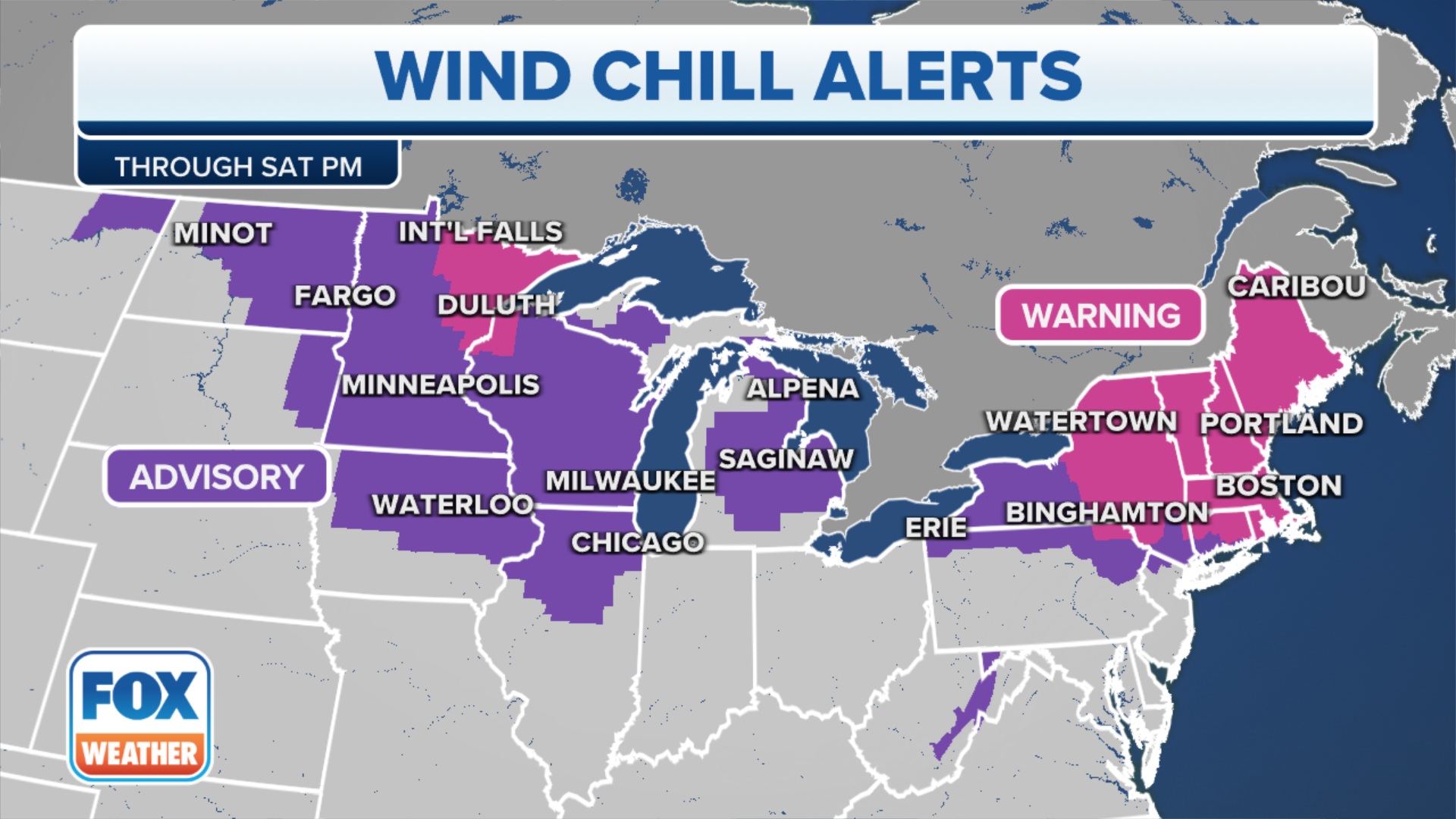Record-breaking cold, life-threatening wind chills plunge 150 million Americans into deep freeze
Subfreezing temperatures have reached as far south as the Gulf Coast as millions across the region feel their coldest wintertime temperatures in several years. Dangerously cold temperatures will now spread into the Great Lakes and Northeast for Christmas weekend, freezing areas in the wake of a crippling winter storm.
Northeast sees weekend flash freeze threat
Gusty winds and subzero wind chills will impact the Northeast on Saturday.
A bitter and deadly blast of arctic air is continuing to charge its way across the U.S., dropping wind chills to as low as negative 70 degrees across the northern Plains, and 30 below zero in the Midwest.
The cold air has made it all the way to the Gulf Coast and Florida where Hard Freeze Warnings have been issued through at least Christmas Day by the National Weather Service.
The dangerously cold arctic air began its week-long journey by surging to the south out of Canada last weekend, dropping low temperatures Monday morning to negative 20 degrees and lower across northern Montana.
WHAT DOES THE WIND CHILL MEAN?

It was a preview of what was to come as the cold air spread across America’s heartland to the East Coast.
Wind Chill Warnings are in effect for most of the northern and central Plains, Midwest, parts of the inland Northwest, South Texas, including Houston, and into Florida.
More than 150 million Americans are under various cold temperature alerts, with the coldest of the air arriving before the holiday is out.
It's not only the record-breaking cold temperatures coming with the arctic front, but also a period of snow and strong winds that reached as far south as Oklahoma on Thursday and as far east as New York as of Friday morning.
Winds gusted to more than 30 mph, creating extremely hazardous travel conditions from Kansas to Wisconsin.

South goes into the Deep Freeze
After spending days freezing the Midwest, the bitter blast of cold air surged south Friday, setting up for one of the coldest holiday's in recent memory.
Morning low temperatures Friday morning were in the teens and single digits as far south as Oklahoma, Arkansas and Tennessee, according to the FOX Forecast Center, while temperatures remained in the teens from Central Texas to Georgia.
Dallas Fort Worth International Airport dipped to 11 degrees early Friday – one of its coldest December temperatures since 1989. Nashville, Tennessee, bottomed out at negative 1 degree Friday morning, marking the first time the city has dropped below zero since Feb. 5, 1996. Houston dropped to 15 degrees Friday morning and struggled to reach the freezing mark during the day.

"Areas like Oklahoma, Arkansas, northern Texas and northern Louisiana, and the Mississippi Delta – you have to be prepared for the cold as well as potential power outages as the wind gusts will be quite strong along with the potential for a freeze," said FOX Weather meteorologist Steve Bender.
Large patches of the Southeast will see temperatures in the teens and 20s Saturday with afternoon highs will manage to stay well below normal.
The arctic air is expected to remain entrenched through the weekend and freezing temperatures will still be likely into early next week.
7 WAYS TO PREVENT FROZEN WATER PIPES IN BITTERLY COLD TEMPERATURES
Dangerous chill impacting Great Lakes, Northeast
Meanwhile, snow in parts of the northern tier of the country was accompanied by blizzard conditions and dangerous cold temperatures.
After many below zero observations Saturday morning, the FOX Forecast Center said highs will struggle to recover.
Afternoon temperatures are expected to only reach the single digits to teens across the Great Lakes region, with teens and 20s in the interior Northeast.
WHAT MAKES A BLIZZARD DIFFERENT FROM AN ORDINARY SNOWSTORM?

With the dangerous cold, hyperthermia and frostbite will be concerns for people with prolonged exposure to the elements. Negative health impacts can start in minutes if proper precautions are not taken.
Communities across the region have opened temporary warming shelters to provide those without sufficient shelter a place to ride out the arctic air mass.
Temperatures will begin to gradually warm starting Monday with most of the country returning to above average temperatures by the middle of the week.
Flash freeze to make for slippery roads in Chicago, IL
With temperatures expected to drop below zero in the Windy City, slushy snow will freeze overnight, says Robert Ray, FOX Weather correspondent. Northeastern Illinois sees the threat of bursting pipes and power outages amid the Christmas week blizzard.

